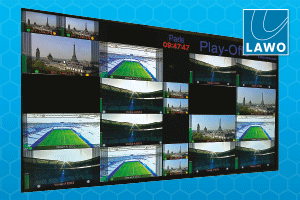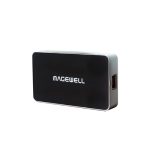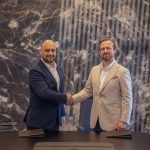The Chairman of Shock Middle East explains how his team equipped the three stations of Dance 97.8, Heart 107.1 and Radio Hala 95.6 with the digital arsenal to overcome barriers of terrestrial borders and devices.

Raed Zidan entered the radio scene at a time when critics were questioning the industrys future. The Chairman of Shock Middle East explains to Supriya Srinivas how his team leveraged radios unique role as a local medium while equipping the three stations of Dance 97.8, Heart 107.1 and Radio Hala 95.6 with the digital arsenal to overcome barriers of terrestrial borders and devices.
The team at Shock Middle East in Dubai Media City had just launched their third station Radio Hala 95.6, dedicated to contemporary Arabic music, and the excitement was palpable as we walked in to ask Chairman and founder Raed Zidan his rationale for launching a third radio station in a year and a half since setting up office.
We just launched Radio Hala and we received more than 5,000 SMS messages on day one around a launch promotion, he tells us. This is unheard of for a new station.
In September 2016, businessman Raed Zidan launched Dance FM in Dubai for what seems like the best reason to set up a radio station. Among the 40 FM channels serving every viable audience segment in the UAE, there was no station dedicated to house, techno, trance and EDM. A lifelong passion for house music also helped. I chased the music of Hardwell, Tiesto and Afrojack around the world, he reveals to BroadcastPro ME.
There are many stories you could choose to write about Raed Zidan the serial entrepreneur with a real estate business; the first Palestinian to scale Mount Everest, and six other peaks around the globe; or the man who has discovered unique audiences in what we thought was a saturated UAE radio landscape.
In early 2016, Theo Makris, a British entrepreneur who had already launched a dance music radio station in the UK with radio expert Digby Taylor, ran some compelling ROI numbers by the Palestinian investor and real estate developer. A year into the launch of Dance 97.8, the radio station has more than 340,000 unique daily listeners, as per figures from market research company IPSOS.
It was a no-brainer then for us to launch two more FM channels, says Zidan, seated in his busy office in Dubai Media City, that has now grown from three employees to 50.
After we saw the success of Dance FM, we looked at the market again to see what else we could launch, because our intention from day one was to build a network and not just stop at one or two or three radio stations. Considering our infrastructure and the staff we have, we focused on another English radio station. With Dance FM, we are targeting the 20- to 30-year-olds, and with Heart 107.1, our target demographic is 30 plus.
After the launch of Heart 107.1 FM, a station of upbeat music from the 90s and noughties, Zidans team launched Radio Hala 95.6 in April 2018. Describing Radio Hala as the only Arabic radio station to tune in and turn up the volume to in the UAE, Zidan stresses that setting up the radio stations was not a leap of faith but a move based on credible numbers.

One of the interesting statistics recently released by Nielsen, was that in terms of listening hours, Heart 107.1 clocked a little over four hours of listening time per day, which is amazing for a new English radio station.
The figures are impressive, considering that it is a challenge for any radio station, especially a new one, to make an impression and change listening preferences. The team at Shock Middle East (SME) knew it would take more than just advertisements across nine bridges on Dubais Sheikh Zayed Road and wrap advertisements on buses and taxis, among other assets across the UAE.
We hired experienced presenters from large, well-known global stations, explains Zidan. The calibre of presenters coupled with music works incredibly well, and thats what keeps audiences coming back. Not just our presenters, every person who has been hired has had extensive radio or media experience, some with 15 to 20 years of radio experience.
Radio presenters on Heart 107.1 include two-time Radio Personality of the Year Dave Cleary and popular local presenter Fadi Mansour, among others
Beyond the acquisition of licences and FM frequencies and the recruiting of experienced onair talent, Zidan stresses that the music played is curated with care.
Listeners do not want music repeated 50 times a day or music that plays on every other radio station. Our music committee is amazing at choosing the right music for the right audience for each station. We choose our music in-house; we do not buy ready-made lists.

The modus operandi for launching radio stations then seems clear find a gap in the existing radio offering, move quickly to create a brand and put together an appealing group of on-air talent. Radio expert Digby Taylor and Head of Programming at Shock Middle East, explains that radio is categorised into formatics. Heart 107.1, for instance, is defined as Hot AC or Hot Adult Contemporary and has captured an underserved demographic.
While terrestrial radio has undeniable advantages in terms of the mediums reach, habitual listenership, local presence and brands, analysts have urged the industry to invest in compelling digital services or face obsolescence. Taylor recognises that the radio industry can no longer wait out the digital disruption.
He says: We did not build the studios for just 2016, 2017 and 2018. We built them anticipating developments for the next five years. We invested heavily from day one, not just in the studio but even with the tower in changing the panels on the antenna to ensure better reception. We have a skilled team of engineers, one of whom specialises in transmission towers and infrastructure. We constantly monitor our frequencies and carry out RF surveys on a monthly basis to see if there are areas in the TX footprint that need attention. This can naturally be a challenge, but we have great cooperation from the licensor and their own engineering team.
We did not build the studios for just 2016, 2017 and 2018. We built them anticipating developments for the next five years Digby Taylor, Head of Programming, Shock Middle East
Taylor reiterates what we have known for some years: radio is no longer just the spoken word. Giving an overview of the technology deployed, he says: We have installed the latest camera technology in the studios, with cameras attached to every microphone. In the Dance studio, we have the Axia Fusion Desk, which is a fantastic state-of-the-art desk. We have the Axia iQ desk in the Heart FM studio. Panasonic HD cameras are installed in the main studio as well as in the Heart FM studio. We are hopefully building a third on-air studio, which will have the next generation of Axia desks. And we are not standing still. We visit broadcast shows such as CABSAT to keep looking for cutting-edge technology.

The fact that the Shock Middle East studios are IP-enabled will be music to the ears of IP proponents in the broadcast industry. There are no audio cables in the building, says Taylor. It is all IP audio. I am proud to say we have the best IP audio engineering team in the country. Also, all our telephony is IP-based as well.
To the inevitable question on the imminent digital tsunami threatening traditional radio, both Zidan and Taylor outline how they are proactively taking the battle to the digital territory. The Dance FM app has four digital stations that can be downloaded globally, as does Heart FM. With Radio Hala, the digital medium allows them to tap into lucrative regional markets such as Saudi Arabia. In terms of global ambitions, Zidan makes it clear that he does not want to be restricted to the UAE, with Dance FM reportedly being consumed in Canada, the US and across Europe.
On the challenges around licensing, Zidan says: Its only a challenge in that music licensing is in its infancy in the UAE. Shock Middle East has, from the outset, made a point of being fully licensed by the major record companies. Our licensing is worldwide. As a business, we felt it necessary to have full coverage and not to be geo-blocked.
Analysts predict that by 2020, an estimated 75% of new cars will be connected to digital services, denting radios monopoly on the car dashboard and relegating AM/FM to just one of a series of audio options behind the wheel. This does not faze Zidan.
Our studios are ready for the digital age, and if digital radio kicks in, we are prepared. The way people consume radio is very different from 10 years ago or even five years ago. The latest audience surveys tell us that 44% of radio is consumed on devices. The convergence of media is critical to our business model.
Even as radio broadcasters increasingly stream content over the internet and experiment with new formats such as podcasts and video, Zidan believes traditional radio, as a more personal medium than TV, will retain its place. The human connection is vital, he stresses. Computer algorithms that select songs on iTunes Radio and Spotify are no match for expertcurated songs and presenters with engaging on-air conversation around local and international news.
People dont just want playlists. Our presenters know the communities they are addressing, and they make the difference.
Zidan has multiple measures to gauge the success of his radio venture, but the most critical gauge, apart from encouraging numbers from IPSOS and Nielsen, is the fact that Shock Middle East has not lost a single advertiser.
In fact, he says, they have all returned, testifying to the fact that their campaigns on our station have made an impact.
Zidans work days are divided between the two unlikely fields of radio and real estate. That the businesses are around eight hours apart in Dubai and the US helps. Every bit the hands-on manager, he admits that real estate is a more predictable business. However, despite the dearth of historical data, current indications allow him to say the radio business will be more lucrative in the long run. His optimism is not misplaced, considering a staggering 93% of the UAEs estimated 9.2 million people tune in to radio daily according to Nielsen. Leaving nothing to chance, Zidan has ensured that Shock Middle East consolidates its engagement with its growing number of listeners with an inhouse production facility, bespoke retail radio solutions and strategic partnerships with live events.
Knowing a dull commercial can have listeners tuning out, Shock Middle East has an inhouse production facility. Zidan explains: From day one, we have been producing advertisements in-house. We got lucky because we have, in our team, some well-known voice-over producers.
Another key revenue earner has been retail radio, a concept tested in select malls and outlets in the UAE since 2003. Zidan explains the strategy: There are round 60 Spinneys outlets in the UAE. The music you hear has been curated by us and branded as Spinneys Radio. We keep it fresh and updated. We also create promotional advertisements for them around specific products or events.
There is an air of anything can be done in the Shock Middle East studios, which possibly reflects the resilience of radio in the digital era, even while linear TV is floundering. When Radio Jockey Reine Abour Jeily offers fashion tips and sports updates between upbeat contemporary Arabic music on her Radio Hala show Dardasha, it helps that the Blackmagic camera attached to the microphone activates as soon as she starts speaking. 30-second segments of the show are then seamlessly broadcast on the stations social media accounts.
While the American-Arab duo of Tim and Faris exchange witty repartee on Hearts Breakfast Show, listeners also get a chance to chat with guests such as John Legend, Ricky Martin or any of the stellar artists who have stopped by the studio in the past on their way to play at the Dubai Jazz Festival.
Pioneering exclusive partnerships with iconic events in the Shock Middle East stable of radio channels, the Dance 97.8 team recently broadcast live from Tomorrowland, one of the biggest electric dance music festivals in the world.
People dont just want playlists. Our presenters know the communities they are addressing, and they make the difference Raed Zidan, CEO and Founder, Shock Middle East
Like his peers, Raed Zidan understands that radio in the digital age is about watching, interacting and sharing, as well as listening. What he has done particularly well is identify and address lucrative gaps in the radio offering in the region.
Is he done, we ask, given how crowded the UAE radio landscape is?
Crowded? Not really. New Zealand has roughly 4.5 million people and they have 350 radio stations. For 10 to 12 million people, we have around 40 radio stations. In reality, the GCC market is one of the least crowded markets in the world. Clearly, Shock ME has more radio stations in its sights.
Zidan is already expanding the radio business to incorporate events. We have now opened Shock ME Events, and we will be bringing in a couple of big acts towards the end of this year. We are, after all in the business of entertainment.














































































